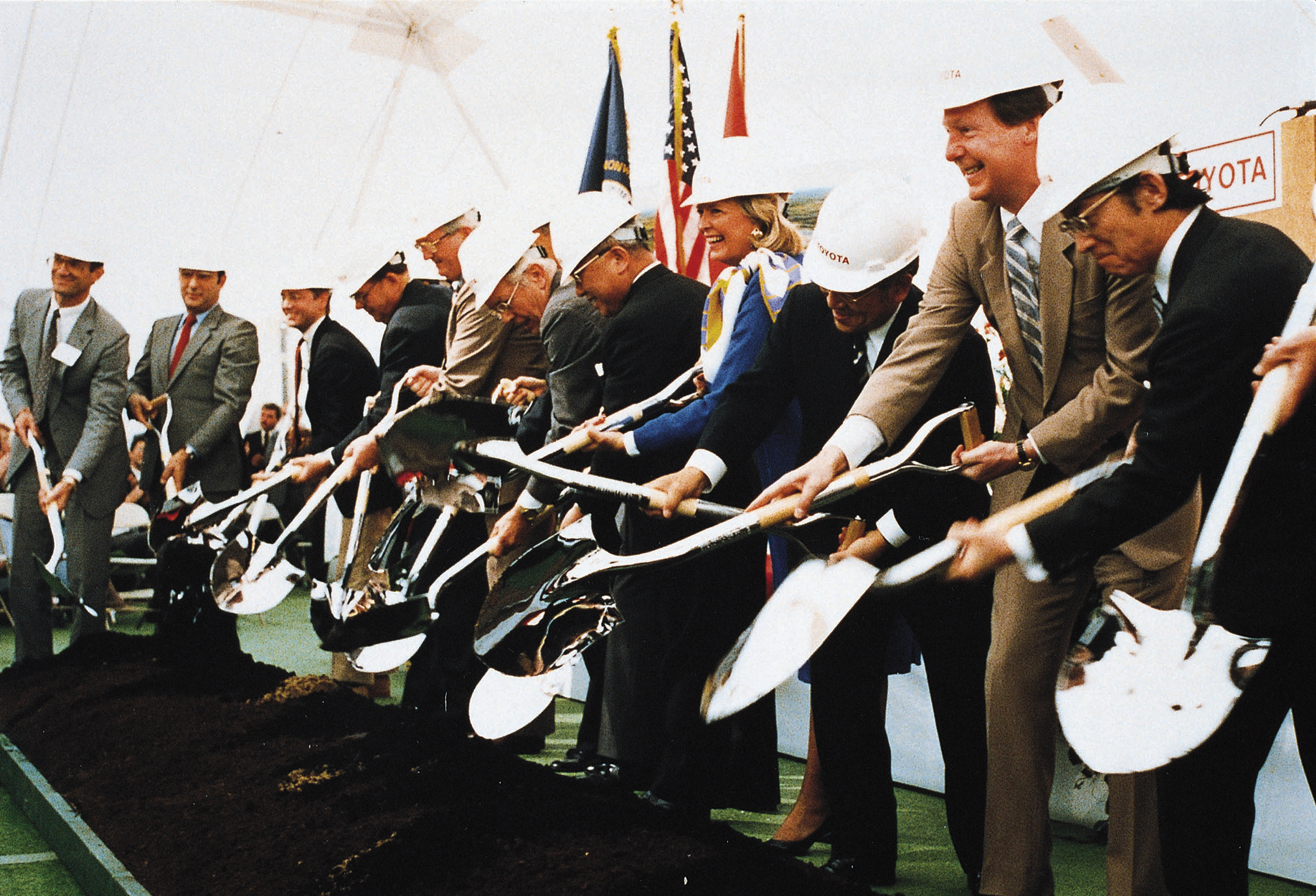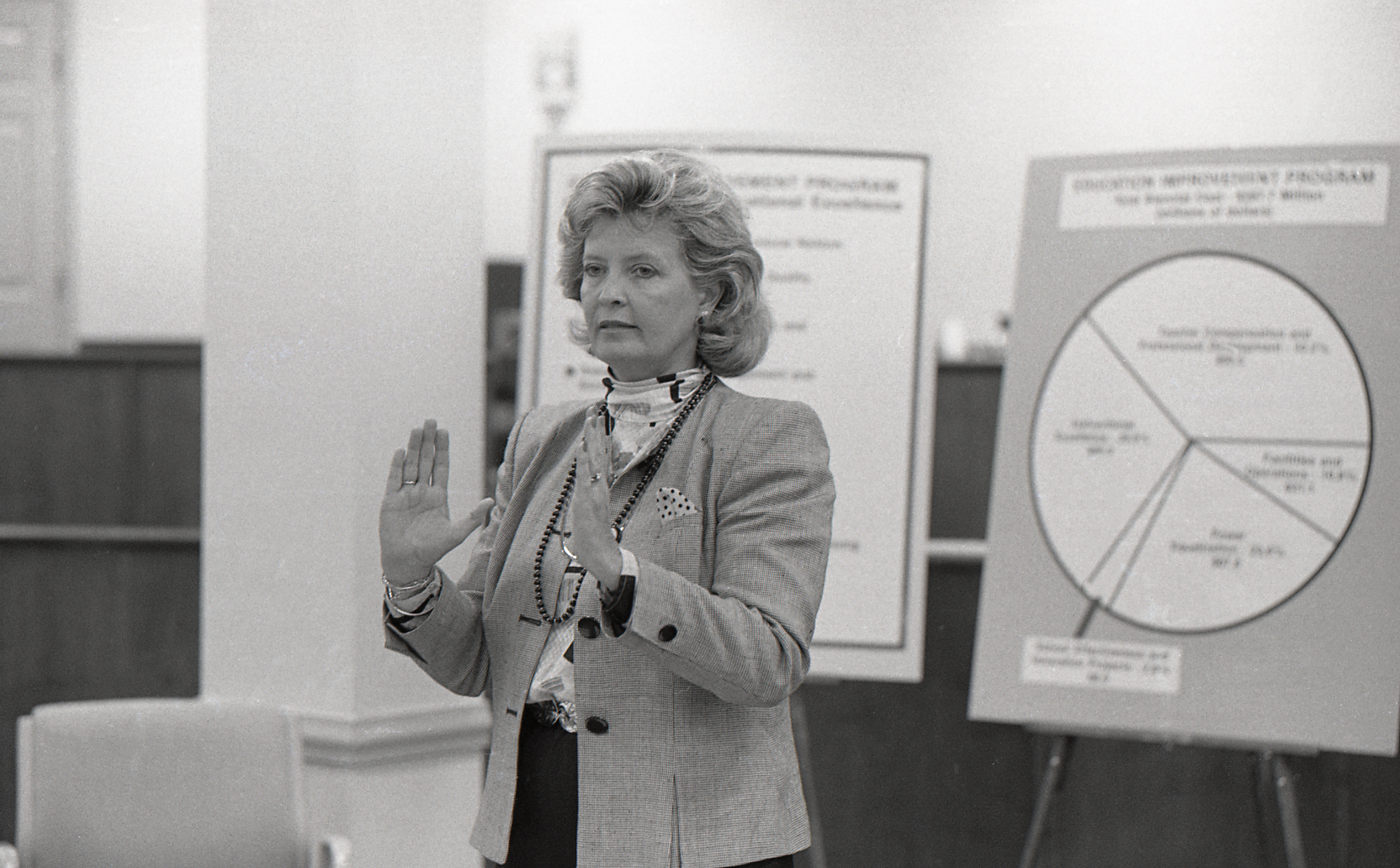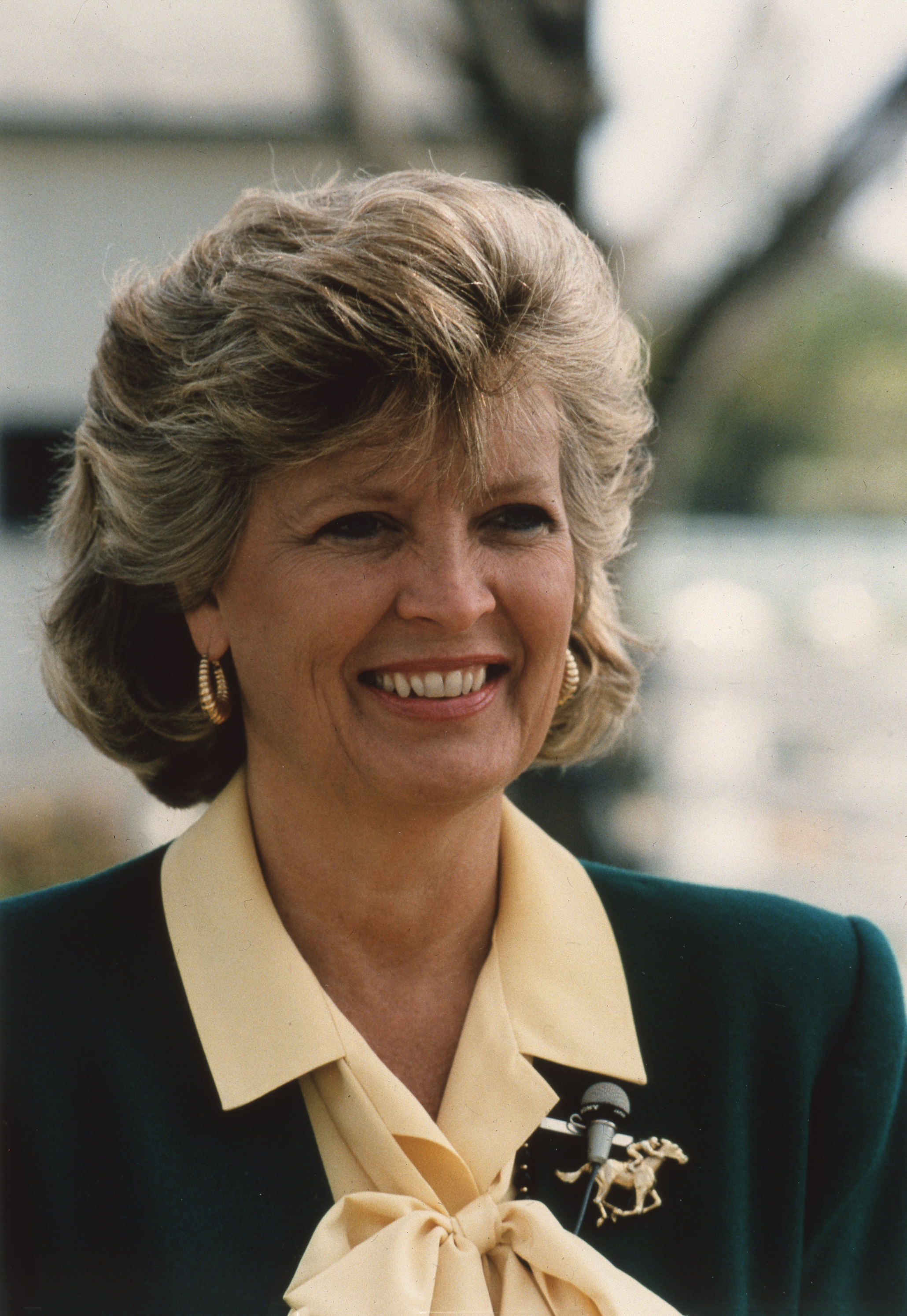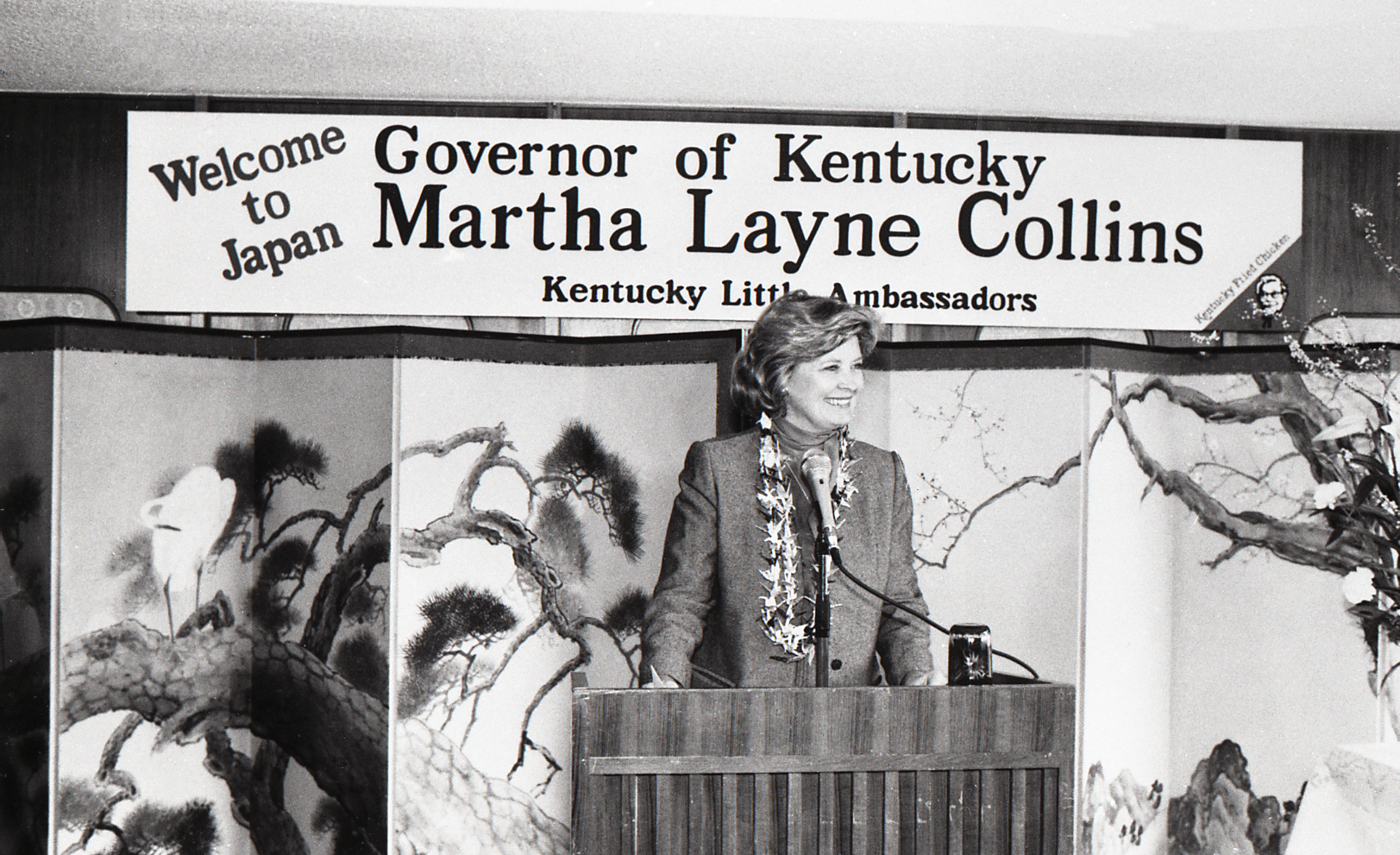



That project alone makes Collins’ administration perhaps the most impactful in state history. Toyota and the network of suppliers that followed took root and grew, resulting in well-paying jobs, industry, investment and wealth generation, tax revenue and life-changing opportunities across most of the commonwealth’s 120 counties.
Collins, a former teacher, also spent political energy on improving education. She was the first and still the only woman elected governor of the commonwealth. As such, she has been an inspirational role model for Kentucky women and girls for more than a generation.
“You always want to feel like you’ve made things better in some way,” Collins said in February, talking about her legacy. “It’s made a big difference in Kentucky in many ways, not just in attitude but in accomplishments for a lot of people.
Collins tells the story of being out shopping and a woman coming up to her to say, “Thank you.”
“I said, ‘Why thank you to me?’” Collins recalls. “She said, ‘Well, my husband works at Toyota and we can send our girls to college.’ All kinds of things like that happened. Also, I think it enriched our state in other ways.”
Kentucky residents, communities, organizations and institutions welcomed and embraced the people who arrived with Toyota and the Japanese companies that followed to create the supply chain for an operation unlike any they’d known previously.
“Having the Japanese plant here and the adjustments that were made and the acceptances that were made…I was always very proud of that,” Collins said.
Traditional route, modern success
She won the governor’s office by old-fashioned politicking through every county in the state, working in campaigns, gaining the post of the state Democratic Party secretary and being elected Kentucky Court of Appeals (later Kentucky Supreme Court) clerk and then lieutenant governor. Winning Toyota was achieved less traditionally, coming about as a result of Collins very intentionally learning the finer points of the Japanese etiquette and a business culture that was male dominated.
The transformation of Kentucky’s business culture that was launched in the late 1980s occurred, in part, because Collins realized that the other finalist state, Tennessee, committed a disrespectful blunder. Punctuality is very important in Japan, but Tennessee kept the Toyota delegation longer than scheduled, causing them to be embarrassingly late for their next appointment—in Frankfort.
The Kentuckians carefully allowed the Japanese to save face as they were greeted, then showed proper business respect by having every detail of their visit highly organized and crafted to impress. Top state officials and private-sector executives were present to answer the delegation’s questions on the spot. The menu was catered to Japanese tastes, dinner seating matched individual hosts with specific tablemates for whom they’d prepared conversion points, the entertainment was chosen to please the visitors, and goodbyes were said as fireworks burst over the nearby Capitol building.
When a member of the Toyota delegation developed a toothache, Collins had UK President Otis Singletary summon an expert faculty dentist to treat him.
There was a lot of preliminary work, much of which had never occurred before and was invented along the way, but Kentucky closed the deal.
Today some 50 Japanese companies and about 100 local entities are members of the Japanese/American Society of Kentucky that sustains favorable business and community relationships.
 Groundbreaking territory
Groundbreaking territory
Collins decided early in her term to pursue Toyota, which had entered U.S. operations a few years earlier in a joint venture with General Motors in California. Having announced it wanted to create an independent, fully controlled U.S. manufacturing site, Toyota’s search had advanced to a point of working with four or five states. Kentucky was not one of them.
Pursuing Toyota was criticized. The governor and her team made a trade visit to Japan and got Toyota officials to consider Kentucky as a candidate. A flurry of trips followed. Collins went, several times. She sent her cabinet secretary and budget director Larry Hayes. She sent her longtime loyal staffer, Crit Luallen. As the state gained traction in Japan, the governor sent legislative leaders, too, to express the support the company could expect long term.
Toyota’s CEO Shoichiro Toyoda let the Kentuckians know what the company sought in a first permanent U.S. manufacturing site: a flat 1,500-acre site with railroad access that adjoined a major interstate highway was primary.
State officials committed to Toyoda that they had what did not yet exist—but they had a good idea where they might stitch together such a site. Former Gov. Ned Breathitt was enlisted to gather options to buy properties in Scott County that are now the site of Toyota’s sprawling complex near Georgetown.
Kentucky’s modern economic development incentives were born from the efforts of Collins and her administration to provide the support and assistance Toyota wanted. To address concerns that it was illegal to spend state funds to benefit a private company, the administration successfully used the strategy of having Hayes sue Gov. Collins in a case that made the planned incentives its central issue. The Kentucky Supreme Court ruled 4-3 for Hayes and the incentives.
“Many of the economic development tools that are used today were created or refined for the Toyota deal,” said Gov. Andy Beshear. “So much of what we do today in terms of providing an incentive package to a company was the innovation in the Collins administration of getting done what needed to be done to draw Toyota to Kentucky.”
The current governor knows Collins well. As a boy during her administration, he lived in Frankfort in the state lieutenant governor’s mansion due to the office his father, Steve Beshear, held.
“Gov. Collins was a phenomenal governor of Kentucky, landing at that time what was the most significant economic development project in our history,” Andy Beshear said. “That helped lay the groundwork for ones we’ve announced since that are even larger. A legacy that everybody wants to leave is a foundation that you can build upon, and always wanting someone to be able to come in to the future with that next incredibly exciting announcement that takes us into the next generation. In many ways, I think that Toyota set the tone for decades.”
“All issues are women’s issues”
Conditions were different when Collins won election and took office in late 1983. There was rising sentiment to empower women. The Equal Rights Amendment to the Constitution that Congress approved in 1982 quickly gained approval from more than two dozen states. Kentucky’s governor was considered to be highest-ranking female elected officeholder in the nation.
But she came to prominence by conventional political hard work and not as a crusader for women’s rights. And she governed as the somewhat conservative Kentucky Democrat that she was. Collins never sought to be at the forefront of women’s rights.
“I’m just interested in women being involved,” she said in discussing her impact. “Sometimes you feel like you need to stay home with the kids and whatever. But for women to be involved and working on things, it enriches your life so much that you’re really a better mom after.”
She still does not want to be pigeonholed.
“I don’t consider myself a women’s leader. I just want to be a leader. I want to be somebody who opens doors and encourages people to walk through them,” Collins said. “I think all issues are women’s issues. Whether it is education or transportation or whatever, it’s an issue that affects women.
“We all have goals, have opportunities whether you’re male, female. It’s taking advantage of something that you’re interested in, that you feel you can contribute to, and try to make this a better place, wherever it is and whatever the issue is.”
Broader horizons for students and business
After leaving office—Kentucky governors were limited to one term through 1992—Collins was executive-in-residence at several universities and colleges, headed the Kentucky World Trade Center and was active in foreign trade initiatives. In those roles, she advocated for the benefit of looking at life globally, especially to students.
“If I had enough money, I would like to get every senior a passport,” she said. “Everybody’s proud of the county they come from and that’s what they’re interested in and talk about.”

Collins urged students “to widen their horizons and to get them to understand (the broader world), to read and to plant foundations, to learn from other countries and, as a citizen of Kentucky, be welcoming to people from other countries.”
Foreign trade brings similar benefits.
“It’s important for Kentucky. Even today,” Collins said. “It’s the technology. It’s the creation of jobs. It helps us as a state to understand different nationalities and opportunities and what the future is going to bring.”
An advanced manufacturing leader
Nearly 40 years later, an initial $800 million investment in 1985 has grown into a multibillion-dollar relationship responsible for 9,300 jobs in Georgetown and many thousands more at dozens of suppliers around Kentucky.
Kentucky is home to subsidiaries of companies that are part of Toyota Group, such as vehicle interiors and filter-maker Toyota Boshoku in Erlanger and supply chain, logistics, recycling and social responsibility innovator Toyota Tsusho America in Florence and Georgetown.
Toyota’s presence made Central Kentucky an early adopter of “lean systems” and efficient just-in-time supply chains and logistics—an approach sometimes referred to as “The Toyota Way.”
It’s helped make Kentucky a world center of advanced manufacturing. At the company’s instigation, the Kentucky Community and Technical College System created successful manufacturing technology training programs that have spread to many other states.
Today Kentucky is the No. 2 auto manufacturing state by volume and No. 1 per capita.
Home to many firsts, Toyota Motor Manufacturing Kentucky (TMMK) was the first wholly owned plant in the U.S., the first to assemble the Toyota Camry, and will soon become the first to assemble hydrogen fuel cell modules for use in heavy-duty commercial trucks. Since starting production 35 years ago, TMMK has built more than 13 million vehicles and nearly 14 million powertrain units.
The TMMK website today reports it has 9,203 direct jobs and 3,513 indirect jobs in Kentucky. Its Service Parts and Accessories Operations, in Hebron, manages a parts center, supplying all North American Toyota distributor and other international distributors as well as U.S. Toyota and Lexus dealers.
The North American Production Support Center in Georgetown, Ky., is one of three regional production support centers globally that provides fundamental skills training to instructors who eventually train team members at manufacturing plants across North America. They also provide training to supervisors in daily operations management and team member support and development.
Toyota has made direct investments of $8.9 billion and another $343 million in indirect investment. In the five-year period between 2016 and 2021, Toyota invested $2.1 billion.
The company’s philanthropic activity has topped $152 million in Kentucky, including that from its 20 dealerships around the state.
The Toyota system is a major element of Kentucky’s massive vehicle-manufacturing sector. Including suppliers for TMMK, two Ford production facilities in Louisville and General Motors’ Corvette plant in Bowling Green, Kentucky’s Cabinet for Economic Development reports more than 564 automotive-related companies that employ over 103,000 as of May 2022. The state’s automotive exports were $4.8 billion in 2019. The state’s four production facilities rolled out more than 5.8 million vehicles from 2017 through 2021.
 The company also played a role in the state’s ability in 2021 and 2022 to win nearly $9 billion in projects related to electric-vehicle battery production.
The company also played a role in the state’s ability in 2021 and 2022 to win nearly $9 billion in projects related to electric-vehicle battery production.
“The Collins administration showed Kentucky can get the job done, landing the first Toyota facility in the United States, how successful it has been in the decades since, our ability to welcome the Japanese culture and build lasting relationships that have grown,” Beshear said. “Today, when we talk to a Ford or an Envision or a major manufacturer, we can point to Toyota and show how we got the job done. When we are talking to a foreign-owned company, we can talk about how Kentucky is a welcoming place in many ways because of the example that the Collins administration set.”



















